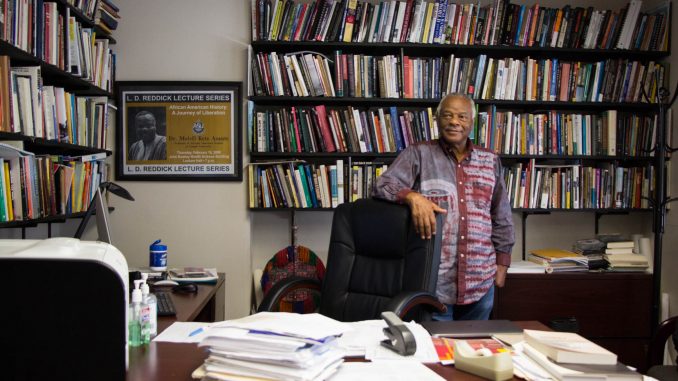
When Temple University announced its $1 million commitment to anti-racist education on Wednesday, Molefi Kete Asante felt it was one of the most significant initiatives related to culture and race since he joined the university.
“[Our faculty members] are very excited,” said Asante, chair of the department of Africology and African American studies. “Some of us said, ‘Well, finally, at last, somebody has heard that Temple had the first PhD in African American studies in the nation. Finally, somebody has heard how we produce more PhDs in this field than any other university.’”
The initiative, which includes a financial reinvestment in the Department of Africology and African American studies, the creation of a center for anti-racist research, an evaluation of Temple Police, a summer bridge program for North Philadelphia high school students and more, leaves some with hope and excitement about Temple’s role in global anti-racist work, while others are concerned about the long-term efficacy of the plan.
Valerie Harrison, senior advisor to President Richard Englert for equity, diversity and inclusion, oversaw the creation of the initiative. Like Asante, she said the plan is important to her because it acknowledges the Department of Africology and African American studies’ international recognition and its esteemed faculty and alumni.
“The department’s graduates include people you know, like the activist Jesse Williams and nationally recognized scholars like Ibram Kendi and Eddie Glaude,” said Harrison, a 2015 Africology and African American studies alumna. “These people are among the most significant voices for racial equity of our time, and the fact that this initiative includes a recommitment to that department’s great work is really significant for me.”
The initiative meets some of the demands set in two June letters separately penned by Asante and 19 graduate students in the department, including calls for increased faculty and greater resources for the department.
In the 1990s, the department had up to 14 faculty members, but has since declined to eight, Asante said. Although Asante asked for seven faculty positions in his letter to Englert, Temple’s anti-racist initiative granted the department four full-time faculty members.
Tarik Richardson, a second-year Africology and African American studies PhD candidate and spokesperson for Temple’s Organization of Africology/African-American Studies Graduate Students, is concerned about whether the university will continue funding this initiative in the future. Because Englert is planning to retire, Richardson wonders who will continue leading this initiative in the coming years.
“I’m just concerned that the support is gonna fall off,” he added. “And I think that’s why having good relationships with our department or whoever is gonna run these initiatives and institutions down the road, why it’s so important for us to actually be invested.”
Trey Lipscomb, a fourth-year Africology and African American studies doctoral candidate, said the initiative’s goal of establishing a center for anti-racist research is a positive change, but it “centers the conversation more toward whiteness and white response to Blackness.”
“Our research is not one that is wholly focused on centering whiteness or wholly focused on racism or even anti-racism,” Lipscomb said. “Africology is the Afrocentric study of the African world and all African phenomena, transgenerationally and transcontinentally. Racism and the history of racism, when you look at the long history of African culture, that’s only a small component of what we do.”
The graduate students are asking for an Africana studies center to reflect the department’s focus, Lipscomb said.
Asante said it’s necessary to focus on cultural studies but believes this work can be done within and alongside the center’s anti-racist research.
Richardson is excited about the summer bridge program for North Philadelphia youth because it aligns with Temple’s long history of working with the community, he said.
“[Temple] was founded as a school and institution for people in the community, so it’s only right that we try to connect that with the people from this area,” Richardson added.
Temple’s initiative will also prioritize recruiting and retaining people of color to ensure a more diverse faculty and staff, according to the announcement.
The initiative’s changes in hiring practices highlights the challenges of those who have difficulties accessing jobs that pay well, said Shirley Moy, the executive director of Lenfest North Philadelphia Workplace Initiative, one of the five organizations that will receive additional resources from the university, according to the announcement.
Moy hopes the initiative will give more North Philadelphia residents access to university jobs and bring a more equitable representation of Black and brown individuals at upper management levels.
Seven percent of all faculty members and five percent of all tenured professors at Temple are Black, according to the university’s 2019-20 fact book.
Diane Turner, curator of the Charles L. Blockson Afro-American Collection, said the initiative is a welcome addition of resources. As the collection receives more inquiries about African American history and culture, Turner hopes for more space, more staff and more community programming to answer those questions.
“That’s what we do in the Blockson Collection, educate because that’s what you have to do in order to eradicate and destroy systemic racism,” Turner said.
Turner sees Temple in the future as making a global impact on systemic racism because of the initiative, she said.
Zach Brooks, a fourth-year Africology and African American studies PhD candidate, is uncertain about the future success of Temple’s anti-racist initiative and feels the university needs to follow through and empower the Department of Africology and African American studies with the financial resources they need to implement new programming.
“I really do think it has a lot to do with the level of sincerity,” Brooks said. “Are you going to empower people that have expertise and knowledge and understanding about these kinds of issues, or are you just gonna give people whatever you wanna give them so they stop complaining and stop protesting?”


Be the first to comment